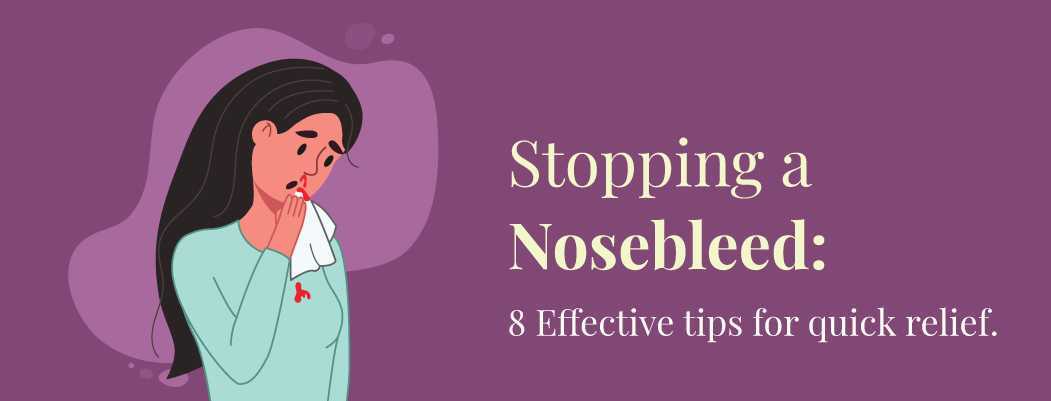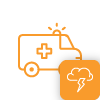How to stop a nosebleed
February 14, 2023

A nosebleed, also known as epistaxis, is a common occurrence where blood drips from the nose. While it may be scary, nosebleeds are usually harmless and can be easily treated at home. However, in rare cases, nosebleeds can be a symptom of a more severe condition, such as high blood pressure or a blood clotting disorder. So, it’s essential to know the potential causes and when to seek medical attention.
Table of Contents
Causes of Nosebleeds:
Nosebleeds can occur due to a variety of reasons, including:
- Dry air: Exposure to dry air can cause the lining of the nose to become dry and crack, leading to a nosebleed.
- Nose picking: The inside of the nose is delicate, and picking it can cause small cuts that result in a nosebleed.
- Trauma: A blow to the nose, such as from a fall or during sports, can cause a nosebleed.
- Infections: Infections like sinusitis or the common cold can cause a nosebleed.
- High blood pressure: High blood pressure can put pressure on the blood vessels in the nose and cause a nosebleed.
How to Stop a Nosebleed?
Most nosebleeds can be treated at home using the following steps:
- Stay calm:Although a nosebleed can be a scary experience, it’s important to stay calm and keep your head elevated. Sit up straight and tilt your head slightly forward. This will prevent blood from running down the back of your throat, causing you to swallow it.
- Pinch your nose:Using your thumb and index finger, pinch the soft part of your nose just below the bridge. Apply gentle pressure and hold for 10-15 minutes. This will help the blood vessels in your nose to clot.
- Apply a cold compress:After the bleeding has stopped, apply a cold compress, such as an ice pack wrapped in a towel, to the bridge of your nose. This will help to reduce any swelling and soothe the area.
- Avoid blowing your nose:To prevent the nosebleed from starting again, avoid blowing your nose for at least 24 hours after the bleeding has stopped.
- Use a nasal decongestant:If you are experiencing a nosebleed due to nasal congestion, try using a nasal decongestant spray or drops. This can help to reduce the swelling in the blood vessels of your nose, making it easier to stop the bleeding. However, it’s essential to follow the instructions on the label is critical and not use nasal decongestants for more than three days in a row, as this can cause rebound congestion and worsen your symptoms.
- Keep your nasal passages moist:Dry nasal passages can trigger nosebleeds, so keeping them moist is essential. Try using a saline nasal spray or a humidifier to add moisture to the air. This can help to keep your nasal passages from becoming too dry and reduce the risk of a nosebleed.
- Avoid hot and spicy foods:Eating hot and spicy foods can cause blood vessels in the nose to dilate, increasing the risk of a nosebleed. If you are prone to nosebleeds, avoiding hot and spicy foods is best until the bleeding has stopped.
- Avoid strenuous activity:Strenuous activities, such as exercise or heavy lifting, can increase blood pressure and cause a nosebleed. It’s best to avoid these activities until the bleeding has stopped and your nose has fully healed.
- Use petroleum jelly:Applying a small amount of petroleum jelly, such as Vaseline, to the inside of your nose can help to moisturise and protect the delicate lining of your nasal passages. This can help to prevent nosebleeds caused by dry nasal passages. Use a cotton swab to apply a small amount of petroleum jelly to the inside of each nostril, but avoid inserting the cotton swab too far into your nose, as this can cause further irritation. It’s best to apply petroleum jelly in the evening before bedtime, as this allows it to work overnight without interfering with your daily activities.
- Seek medical attention for recurrent nosebleeds:If you are experiencing recurrent nosebleeds, it’s essential to seek medical attention to determine the underlying cause. Your doctor may recommend further tests or refer you to a specialist to rule out any underlying medical conditions.
When to Seek Medical Attention?
While most nosebleeds can be treated at home, there are certain situations where you should seek medical attention:
- If the bleeding does not stop after 20 minutes of applying pressure.
- If the bleeding is heavy or you feel lightheaded or dizzy.
- If the nosebleed results from a head injury or you are experiencing severe pain.
- If you are experiencing frequent nosebleeds, mainly if they occur without any apparent cause.
Which doctor to consult for nose bleeding?
If someone is experiencing frequent nosebleeds, it is essential to seek medical attention from an ENT (ear, nose, and throat) specialist, also known as an otolaryngologist. The specialist will thoroughly examine the nose using an endoscope, a small pencil-like scope that can provide a detailed view of the nasal passages. Based on the results, the specialist will make appropriate recommendations for treatment. It is crucial to address frequent nosebleeds with a medical professional to rule out any underlying medical conditions and to prevent further complications.
How to prevent Nosebleeds?
Here are some tips on how to prevent nosebleeds:
- Keep your nasal passages moist:Dry nasal passages can increase the likelihood of nosebleeds, so it’s essential to keep them moist. Try using a saline nasal spray or a humidifier to add moisture to the air. This can help to prevent your nasal passages from becoming too dry and reduce the risk of a nosebleed.
- Avoid picking your nose:Picking your nose can cause irritation and damage to the delicate blood vessels in your nose, leading to nosebleeds. Make a conscious effort to avoid picking your nose, and keep your hands away from your face as much as possible.
- Use a humidifier:Using a humidifier in your home can help keep the air moist and prevent your nasal passages from drying. This can be especially helpful during winter when indoor heating can dry out the air.
- Avoid irritants:Avoid exposing your nose to cigarette smoke, strong chemicals, and allergens. If exposed to these irritants, wear a mask or cover your nose to protect it.
- Be gentle:Be gentle when blowing your nose, and avoid blowing it too forcefully. This can cause trauma to the blood vessels in your nose and lead to nosebleeds. Instead, blow your nose gently and use a saline nasal spray to help clear your nasal passages.
- Manage your blood pressure:High blood pressure can increase the risk of nosebleeds, so it’s essential to manage your blood pressure through regular exercise, a healthy diet, and medication if prescribed by a healthcare professional.
Summary
A nosebleed is a common occurrence that can be easily treated at home. However, knowing the potential causes and when to seek medical attention is essential. You can stop most nosebleeds quickly and easily by staying calm, pinching your nose, and applying a cold compress. If you have any concerns or are experiencing frequent nosebleeds, be sure to speak with your healthcare provider to determine the underlying cause and discuss treatment options.
People also ask
1.What should you not do during a nosebleed?
During a nosebleed, avoiding blowing your nose, tilting your head back, or inserting anything into your nostrils is important. These actions can aggravate the bleeding and make it worse. Instead, sit upright and lean your head slightly forward while applying pressure to your nostrils with your fingers.
2.What are the 3 common causes of nosebleeds?
The three common causes of nosebleeds are dry air, injury or trauma to the nose, and nose picking. Other less common causes include infections, high blood pressure, blood clotting disorders, and tumours in the nasal cavity.
3.How long is too long for a nosebleed?
If a nosebleed lasts for more than 20-30 minutes, or if it is heavy and persistent, it is considered too long, and medical attention should be sought. Additionally, if the bleeding is accompanied by other symptoms such as dizziness, shortness of breath, or chest pain, it is important to seek medical help immediately.








